Under the scorching sun at Tema Station, Afia Ardey meticulously arranges plantains on her modest stall.
Her dream is simple: secure a loan to grow her business and fund her daughter’s secondary education.
Yet, for Afia and millions of Ghanaians, such aspirations are stifled by a harsh reality, billions of dollars in public funds are lost annually to corruption and illicit financial flows.
Ghana loses an estimated $3 billion each year through trade misinvoicing, tax evasion and economic crimes, contributing to Africa’s staggering $60 billion annual loss, with $40 billion tied to the extractive sector alone.
These illicit flows, fuelled by embezzlement, bribery and money laundering, erode public trust, deepen inequality and stall development.
“When leaders steal, the people bleed,” says Yvette Anthea Owusu, an analyst at Ghana’s Financial Intelligence Centre.
“Most citizens don’t even realise how much has been taken from them.”
She emphasises that recovering stolen assets is not just about reclaiming funds but also about dismantling the criminal networks profiting from systemic corruption.
Ghana is intensifying its efforts to recover misappropriated wealth. In 2023, the Office of the Special Prosecutor (OSP) and the Economic and Organised Crime Office (EOCO) froze or seized over ₵100 million in suspected illicit assets linked to high-profile corruption cases. EOCO is now pushing to repeal its governing Act, with lawyer Emmanuel Dzakpata explaining, “The new Act will allow us to retain a percentage of recovered assets to strengthen our operations.”
Meanwhile, the OSP is advocating a dedicated anti-corruption chapter in Ghana’s constitution to harmonise fragmented laws and bolster enforcement.
Such reforms, they argue, would enable more coordinated and impactful action against corruption.
Civil society steps up
Civil society is also driving change. The Ghana Anti-Corruption Coalition (GACC), with support from the Inter-Governmental Action Group Against Money Laundering in West Africa (GIABA), launched a campaign titled: “Building Political Will and Public Support for Asset Recovery in Ghana.”
The initiative engages journalists and community-based organisations across five regions to raise awareness of asset recovery and proceeds-of-crime laws.
At the campaign’s launch, GACC Executive Secretary, Beauty Emefa Narteh, underscored the media’s critical role. “Journalists with a deep understanding of Ghana’s asset recovery framework can effectively spotlight corruption,” she said. “If the media fails, the public is left with incomplete or misleading information, undermining the fight.”
GACC’s Assistant Communication Officer, Pamela Laourou, added that the campaign equips journalists with knowledge while simplifying asset recovery for citizens. “It’s not just the responsibility of institutions,” she said.
“Citizens must report corruption and suspicious activities to bodies such as EOCO, FIC and OSP,” she stressed, adding that Ghanaians have the right to demand accountability from public officials managing public resources.
Empowering citizens through awareness
The campaign leverages infographics and social media to educate the public, emphasising culturally relevant and accessible messaging.
“We cannot recover what we don’t understand,” says Samuel Harrison Cudjoe, a GACC Programme Officer. However, he warns that partisanship remains a significant barrier to progress.
GACC’s prior work on illicit financial flows shows that informed citizens drive accountability.
By fostering public engagement, the coalition aims to transform asset recovery from legal jargon into a tool for nation-building.
A path to equity and trust
Ghana’s intensified efforts signal a turning point in the fight against corruption. With billions lost annually, recovering stolen assets is critical to restoring public trust and funding development.
“When citizens stay silent, corruption thrives,” Mr Cudjoe said, adding “But when they speak up, stolen wealth can be traced, seized and returned.”
For Afia Ardey and countless others, these efforts offer hope that recovered funds could fuel opportunities, from small businesses to education, paving the way for a more equitable future.
The writer is an Assistant Communications Officer , GACC

